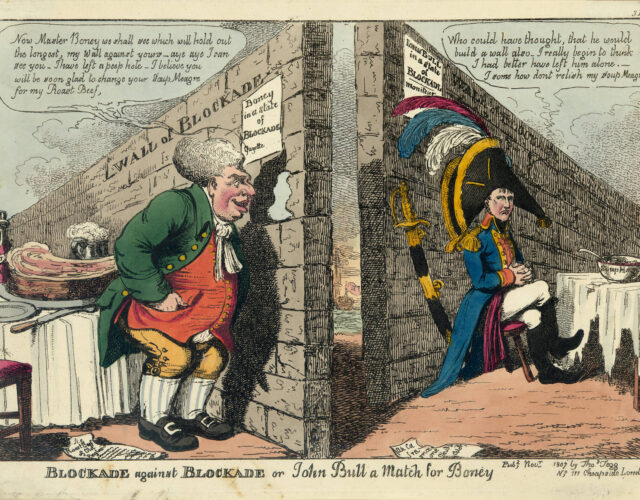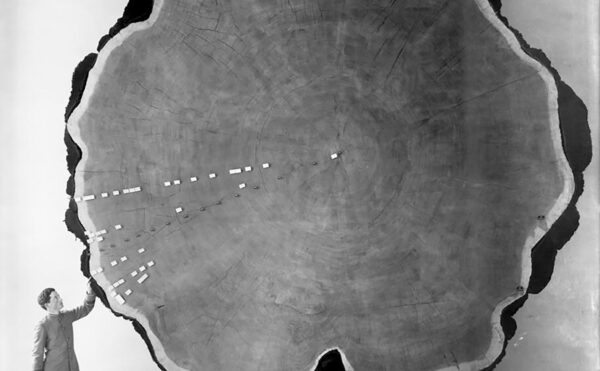On March 25, 1802, after nearly a decade of war, the Treaty of Amiens was signed between France and Great Britain. During the short window of peace that followed, a crowd of curious British men and women rushed to Paris. One of the first was Charles Blagden—chemist, natural philosopher, and longtime Fellow of the Royal Society of London. Blagden, then aged 53, was serving as the society’s informal scientific ambassador.
Blagden was in Paris not to steal French secrets but to forge connections. Captivated by France and French science after a visit as a young man, he had since cultivated a double identity: an Englishman when in Paris but a Francophile in London. This made him an effective go-between, though his dual loyalties left him balanced awkwardly between the two superpowers of the age.
Blagden was impressed by what he saw in France. Science there had suffered some blows during the French Revolution—including the abolition of the Academy of Sciences and the death of Lavoisier under the guillotine—but it had emerged invigorated, lavishly supported by a more moderate regime. And Blagden’s old friend from before the revolution, Claude-Louis Berthollet, was now at the center of a thriving community of Parisian chemists. Berthollet gave Blagden a warm welcome to the French capital. Through him Blagden was introduced to the man credited with having finally brought stability to France, First Consul Napoleon Bonaparte. Blagden was struck by Napoleon’s way of talking with the French men of science on informal and equal terms and by his lavish patronage for scientific pursuits. “A very remarkable man,” Blagden told his friend Joseph Banks, president of the Royal Society and the most powerful figure in British science.
Blagden was convinced that Napoleon was committed to peace in Europe. That was a rather poor assessment: a year later war had resumed and France was again closed to Blagden. Back in London in the comfortable surroundings of Joseph Banks’s private library in Soho Square, Blagden set himself to the task of maintaining links with the French chemists across the frontiers of war.
He had plenty of work to do: the Napoleonic Wars (1803–1815) were vintage years for chemistry. Alessandro Volta’s battery—announced in 1800 and demonstrated for Bonaparte the next year—had given chemists a new tool, and they applied it to the analysis of matter with spectacular results. By Napoleon’s fall the battery had helped add the newly discovered elements potassium, sodium, magnesium, calcium, strontium, and barium to the chemist’s arsenal. Boron and iodine also made their debut in the laboratory; and chlorine, previously thought to be a compound, was recognized as an element.
Blagden and his friends liked to talk of the pursuit of science as being above war and national conflict. But his efforts to sustain communications had a more pragmatic basis: chemists in Britain and France both desperately wanted to know about each other’s work. This need for information persisted even—and especially—when their rivalry, heightened by wartime nationalism, was most intense. In England the young chemist Humphry Davy took the lead with his discovery of potassium and sodium in 1807, becoming a national scientific hero. A race was on between the British and the French to decompose other substances. But for Davy to compete with the French, he needed to know what the French were doing. Similarly, French chemists needed to know what Davy’s experiments actually were before they could verify or dispute his conclusions.
Captivated by France and French science after a visit as a young man, Blagden had since cultivated a double identity: an Englishman when in Paris but a Francophile in London.
How was Blagden to get information between Paris and London, capitals of the two most inveterate adversaries of the Napoleonic Wars? Sending letters or issues of scientific journals between Britain and the European continent had been difficult ever since the beginning of war in 1793. But the greatest challenge came in 1806 when Napoleon imposed a blockade aimed at completely isolating Britain from Europe, his Continental System. Blagden’s mission was to make sure science would run the blockade.
Blagden was well connected, sociable, and deeply informed about European politics. (He spent hours each day reading the newspapers.) He put his connections and knowledge to good use in identifying and exploiting loopholes in the blockade. The United States was neutral in the war, and so Blagden assiduously cultivated friendships with American diplomats in London—including the ambassador and future president James Monroe—arranging for letters to be transported across the English Channel by the new nation’s diplomatic messengers. Other letters were smuggled over with the help of London bankers. With quiet government support Blagden and Banks even exploited the only official link between Britain and France—prisoner-of-war exchange ships—to trade letters, journals, and books with their French colleagues.
Along the way Blagden had to mediate some heated disputes. For several years Berthollet’s protégés Joseph Louis Gay-Lussac and Louis Jacques Thenard denied that Davy’s new metals, potassium and sodium, were really elements. Two hundred years ago this was actually a difficult quarrel to resolve, and Blagden had to work hard to keep both sides informed of the other’s experiments. In the end Gay-Lussac and Thenard lost the argument, but later it was Davy who was forced into admitting defeat: the French chemists were unconvinced when Blagden passed on Davy’s bold claim that sulfur, phosphorus, and carbon were all compounds.
Through letters carried mostly by the American diplomats, Blagden and Berthollet tried to keep the French and British sides in contact during these disputes. But this arrangement put Blagden in a tricky position. He and Davy were never very close, and Davy appeared wary of giving Blagden too much information on the progress of his work, aware that anything he said might be copied into Blagden’s next letter for Paris. Davy’s cutting-edge work in chemistry might have had little military value, but he still wanted to avoid giving his French rivals clues they could use to beat him to the next major discovery.
Davy was embraced as a national hero. But Blagden, whose main value to British science came from being friends with people in an enemy country, remained in the background, largely unknown to a broader public who might mistrust his dual loyalties. So in the end it was in France that Blagden’s efforts were most remembered. When he died in 1820 at Arcueil, just outside his beloved Paris, the event caused barely a ripple in the British press. His French friends, however, organized a long tribute in the Paris newspapers. “None of his countrymen,” it read, “have done more justice to the labors and discoveries of the French.”




